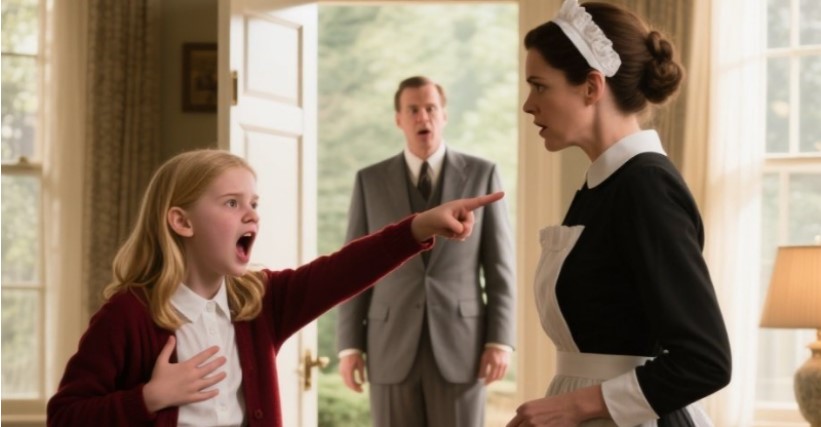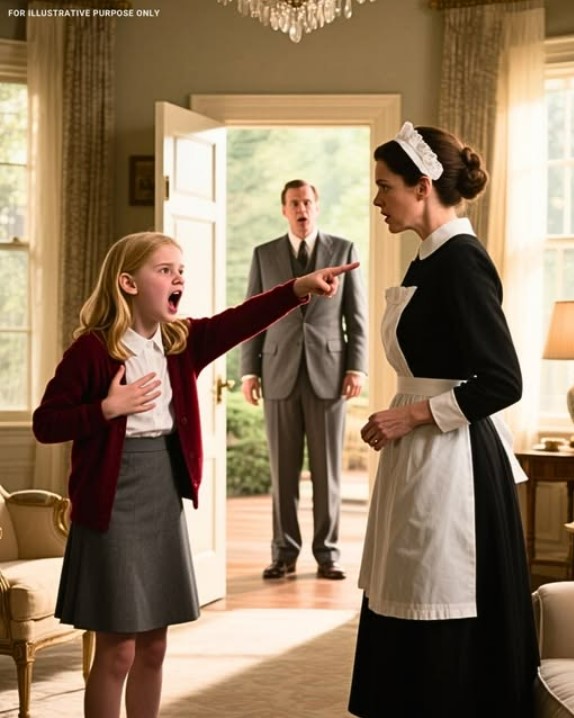James Callahan stood in the marble foyer of his grand home, still holding his briefcase. Upstairs, a crash shattered the silence — followed by his daughter Emma’s angry voice.
He sighed. Not again.
A widower for five years, James had lost more than his wife — he had lost his home’s warmth, his daughter’s laughter, and his peace. Emma, just ten years old, had become defiant and distant. Every maid he’d hired left in tears. Six had come and gone. None had lasted.
That morning, the seventh maid arrived — Rosa Delgado, a quiet woman with kind eyes and a calm smile. “Children just need patience,” she’d said gently. “I’ve raised three of my own.”
James wanted to believe her. He didn’t know that this woman would soon change everything.
When James rushed upstairs, he found Rosa standing by the bed, calm but firm. Emma’s favorite vase lay shattered on the floor.
“What happened?” he asked.
“She hit me!” Emma cried.
Rosa didn’t flinch. “No, sir,” she said softly. “But she said something no child should ever have to say.”
James frowned. “What did she say?”
Rosa looked down. “It’s better if you ask her.”
He turned to his daughter, whose voice trembled as tears filled her eyes. “I told her she’s just like Mom,” Emma whispered. “That she’ll leave too. Everyone leaves.”
For the first time in years, James saw the truth — his daughter wasn’t cruel. She was heartbroken. Beneath the anger was fear. The fear of being abandoned again.
Rosa knelt beside the little girl and placed a gentle hand on her shoulder. “Sweetheart,” she said, “I’m not going anywhere. I promise.”
That evening, Rosa cooked homemade soup and fresh bread — the kind James’s late wife used to make. For the first time in a long while, they ate together without tension. Emma even smiled.

Over the next few weeks, the change was remarkable. Rosa brought warmth into every corner of their home. She hummed softly while cleaning, placed flowers on the dining table, and tucked lavender sachets into Emma’s drawers. Laughter began to fill the house again.
One evening, James found them on the couch — Rosa reading aloud, Emma resting her head on her shoulder. His heart softened. He hadn’t realized how much they both needed this peace.
But when James’s sister visited, she scowled. “You’re getting too close to that woman,” she warned. “She’s just help.”
James replied quietly, “Her place is right where she is — helping my daughter smile again.”
Then one rainy night, Rosa didn’t return from the store. Emma waited by the window, worry clouding her eyes. When the phone rang, James’s stomach sank.
“There’s been an accident,” said the nurse.
At the hospital, Rosa was awake, her arm in a sling. “I’m sorry about dinner,” she whispered. “I didn’t mean to frighten Emma.”
James shook his head. “Don’t ever apologize. You’ve given us more than you know.”
When Rosa came home, Emma ran to her and hugged her tightly. “Don’t ever leave again!”
Rosa smiled through tears. “Never, sweetheart.”
Over time, Rosa shared her own pain — she had lost her husband and son in a fire years ago. That grief had silenced her, just as it had broken them. But in the Callahan home, she found a second chance — a chance to love, to heal, and to belong again.
Months later, Rosa didn’t leave because of conflict. She stayed — not as a maid, but as part of the family.
James often said, “You didn’t just help Emma — you helped me remember what home feels like.”
The woman who arrived as a stranger became the heart of their home — the warmth that brought life, laughter, and love back to a house that had forgotten how to feel.




